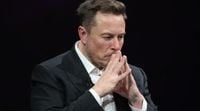In a significant turn of events for Tesla, Inc. (NASDAQ: TSLA), the electric vehicle giant has seen its stock price surge dramatically over the past week, driven by a combination of positive company developments and market trends. As of March 26, 2025, Tesla shares have climbed approximately 25% over the last five trading sessions, marking a notable recovery from five-month lows earlier this month.
On March 25, Tesla shares jumped 3.5%, closing at $288.14, following a nearly 12% leap the previous day. This upward trajectory has sparked renewed interest among investors, particularly as the stock remains over 40% below its all-time high of nearly $500 reached in December 2024.
Analyst Cathie Wood, CEO of Ark Invest, has been a prominent voice in the market, expressing her bullish outlook on Tesla stock. During a recent appearance on Bloomberg TV, Wood stated that she believes TSLA could reach $2,600 within five years, driven primarily by the company's robotaxi initiatives. Wood predicted that these robotaxis could account for 90% of Tesla's stock value in the coming years, with expected margins exceeding 80%, significantly higher than the 15%-25% margins from Tesla's current electric vehicles.
Investors are particularly excited about the upcoming launch of Tesla's Cybercab robotaxi later this year, which Musk has touted as a game-changer for the company's future. In a recent all-hands meeting, Musk urged employees to hold onto their shares, emphasizing his confidence in Tesla's self-driving technology and its potential to skyrocket the company's value.
Despite the positive momentum, Tesla faces challenges, including a recent decision by the Canadian government to freeze $43 million in EV rebate payments and exclude Tesla from future rebate programs due to tariffs. Transport Minister Chrystia Freeland indicated that each rebate claim will now be investigated individually, which could slow down Tesla's cash flow from Canadian sales. However, many investors appear to view this as a temporary setback, focusing instead on Tesla's global reach and the broader market optimism.
On the regulatory front, Tesla received good news with the approval to roll out its Full Self-Driving (FSD) feature in China, the world's largest EV market. This approval, announced on March 24, has also contributed to the recent rally in Tesla's stock price.
Market analysts have differing views on Tesla's future. Wedbush Securities has set a target of $550 for Tesla shares, citing the company's AI and robotaxi potential. Morgan Stanley has a slightly lower target of $400, highlighting the anticipated launch of a more affordable model in mid-2025. Conversely, Wells Fargo has cut its target to $130, warning of ongoing sales challenges and increased competition.
Despite a challenging start to 2025, where Tesla's sales dropped 42.6% in Europe year-over-year through February, the recent launch of the refreshed Model Y is expected to boost sales significantly. Analysts believe that there is pent-up demand for this vehicle in the U.S., which could further enhance Tesla's market position.
As Tesla continues to navigate the complexities of the electric vehicle market, the company remains a leader in the space, boasting a market capitalization of over $700 billion. This figure dwarfs competitors like Ford, underscoring investor confidence in Tesla's long-term value.
With the S&P 500 also showing positive movement, rising 1.8% on March 24, investor sentiment appears buoyed by hopes of scaled-back tariffs under the Trump administration. This broader optimism may provide additional support for Tesla as it seeks to reclaim its previous highs.
As the stock market watches Tesla's next moves closely, the upcoming delivery numbers for the first quarter are anticipated to be a significant indicator of the company's performance. If Tesla can maintain its momentum, analysts predict that a break above the $300 level could pave the way for further gains.
In summary, Tesla's recent stock performance reflects a complex interplay of internal developments and external market factors. While the company faces challenges, including regulatory hurdles and competition from rivals like BYD, which surpassed Tesla in 2024 revenue, the excitement surrounding its innovative products and strategies continues to capture investor interest.
As Tesla moves forward, the question remains: will the current surge translate into sustained growth, or are there more challenges ahead? Investors and analysts alike are keenly observing the unfolding narrative around this electric vehicle powerhouse.





